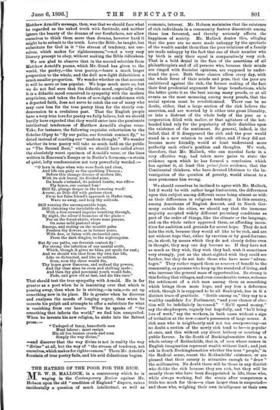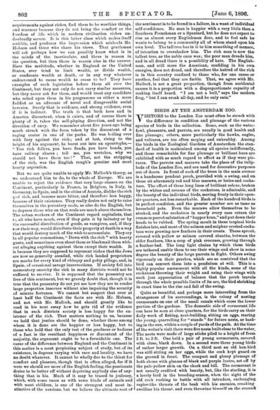THE HATRED OF THE POOR FOR THE RICH.
MR. W. H. MALLOCK, in a controversy which he is waging in the Contemporary Review against Mr. Hobson upon the old "condition of England " dispute, raises incidentally a question of much intellectual, as well as economic, interest. Mr. Hobson maintains that the existence of rich individuals in a community fosters discontent among those less favoured, and thereby seriously affects the happiness of society. Mr. Matlock denies this, alleging that the poor are no more made unhappy by the spectacle of the wealth amidst them than the poor relations of a family are made unhappy by the fact that one of their number who by birth is only their equal is comparatively very rich. That is a bold denial in the face of the assertions of all philanthropists and of all persons who, because their minds are tinged with Socialist opinions, are supposed to under- stand the poor. Both these classes affirm every day, with the whole force of their minds and pens, that the poor are embittered against the rich, the former making of the fact their first prudential argument for large benefactions, while the latter quote it as the best among many proofs, or at all events as the most menacing among many proofs, that the social system must be revolutionised. There can be no doubt, either, that a large section of the rich believe the assertion, and are worried by it either into great liberality, or into a distrust of the whole body of the poor as a corporation filled with malice, or that agitators of the hot- headed kind rely for the popularity of their diatribes upon the existence of the sentiment. So general, indeed, is the belief, that if it disappeared the rich and the poor would stand in a new relation to each other, and if they did not become more friendly, would at least understand more perfectly each other's position and thoughts. We wish, therefore, that Mr. Matlock, who can marshal facts in a very effective way, had taken more pains to state the evidence upon which he has formed a conclusion which has against it, at least this prima-facie evidence, that the Continental thinkers, who have devoted lifetimes to the in- vestigation of the question of poverty, would almost to a man pronounce him wrong.
We should ourselves be inclined to agree with Mr. Matlock, but it would be with rather large limitations, the differences upon this subject among different races being almost as wide as their differences in religious tendency. In this country, among Americana of English descent, and in North Ger- many outside the cities, we should say that the immense majority accepted widely different pecuniary conditions as part of the order of things, like the climate or the language, and on the whole rather approved them, as affording incen- tives for ambition and grounds for secret hope. They do not hate the rich, because they would all like to be rich, and are not without hope that, either by exertion or by good-fortune. or, in short, by means which they do not closely define even in thought, they may one day become so. If they have not as much as they wish, they wish they had, wish it sometimes very strongly, just as the short-sighted wish they could see farther, but they do not hate those who have more "advan- tages:' They rather regard them as sources of benefit to the community, as persons who keep up the standard of living, and who increase the general mass of opportunities. So strong is this feeling that villages, and even considerable towns, welcome the settlement of a rich man among them as something which brings them more hope, and pay him a deference which, though it is supposed to be all flunkeyish, has in it a distinct trace of gratitude. " Settle among us," they say to a wealthy candidate for Parliament, "and your chance of elec- tion will be indefinitely increased." " He'll spend money," say the shopkeepers, vaguely but hopefully, and "he'll bring lots of work," say the workers, in both cases without a sign of irritation at the new-comer's possession of large means. A rich man who is neighbourly and nut too overpowering—as no doubt a section of the newly rich tend to be—is popular at once, and this without any direct bribery or courting of public favour. In the South of Buckinghamshire there is a whole colony of Rothschilds, that is, of men whose names in English imagination represent wealth without limit ; and just ask in South Buckinghamshire whether the true " people," in the Radical sense, resent the Rothschilds' existence, or are pleased that their county is attractive enough to " draw " the millionaires. No doubt there will be those in any district who di-like the rich because they are rich, but they will be usually those who have been disappointed in life, those who, while always working, feel the strain after competence a little too much for them—a class larger than is suspected— and those who, weighing their own intelligence or their own
acqnirements against riches, find them to be worthier things, and murmur because they do not bring the comfort or the freedom of life which in modern civilisation riches un- doubtedly secure. It is this latter class which makes itself audible, and produces the impression which misleads Mr. Hobson and those who share his views. That gentleman will ask perhaps how we can possibly know what is in the minds of the inarticulate, and there is reason in the question, but then there is reason also in the answer. Have the multitude, whether in England or the United States, ever tried to limit wealth, or divide wealth, or confiscate wealth at death, or in any way whatever endeavoured to cause wealth to cease to be P They have examples of such legislation before them all over the Continent, but they not only do not carry similar measures, but they never ask for them, and would treat any candidate who relied upon them in his programme as either a mere faddist or an advocate of novel and disagreeable social heresies. Surely that is evidence, and strong evidence, even if it is indirect. The truth is that both here and in America discontent, when it exists, and of course there is plenty of it, takes the self-pitying direction, and not the direction of envy. We remember about five years ago being much struck with the form taken by the discontent of a raging orator in one of the parks. He was boiling over with fury against the rich ; and at last, rising to the height of his argument, he burst out into an apostrophe,- " You rich fellers, you have funds, you have bonds, you have railway shares ; tell me, you wretches, why we should not have them too !" That, not the stripping of the rich, was the English rough's genuine and most hearty aspiration.
But we are quite unable to apply Mr. Mallock's theory, as we understand him to do, to the whole of Europe. We are unable to reject the evidence that very large classes on the Continent, particularly in France, in Belgium, in Italy, in Germany, in Spain, and in the cities of Austria, dislike the rich ciati rich, and become more bitter, and therefore less happy, because of their existence. They really desire not only to raise themselves in the pecuniary scale, as also do the English, but to depress those who on that scale are much above themselves. The urban workers of the Continent regard capitalists, that
all who have much, even if they gain it by industry or by the successful distribution of goods, as vampires, and, if they s tw their way, would distribute their property at death in a way that would destroy much of the wish to accumulate. They cry iu all popular commotions, Down with the rich" with hearty gusto, and sometimes even shoot them or blackmail them with- out alleging anything against them except their wealth. It is because they are supposed to represent riches that the Jews are now so generally assailed, while rich landed proprietors are marks for every kind of obloquy and petty pillage, and, in Spain, of occasional savage insurrections. If society fell into momentary anarchy the rich in many districts would not be suffered to survive. It is supposed that the peasantry are free of this sentiment, but we gravely doubt that, though it is true that the peasantry do not yet see how they are to render large properties insecure without also impairing the security of minute fortunes. We cannot but suspect that over at least half the Continent the facts are with Mr. Hobson, and not with Mr. Mallock, and should greatly like to read in his next essay how he gets rid of the evidence that in such districts society is less happy for the ex- istence of the rich. That matters nothing to us, because we hold that justice should be done, whether those among whom it is done are the happier or less happy, but to those who hold that the only test of the goodness or badness of a fact is the resultant happiness or discontent of the majority, the argument ought to be a formidable one. The cause of the difference between England and the Continent in this matter is a most perplexing subject of study, but of its existence, in degrees varying with race and locality, we have no doubt whatever. It cannot be wholly due to the thirst for comfort and pleasure, though that is often alleged, for if it were we should see more of the English feeling, the passionate desire to be better off without depriving anybody else of any- thing that is his. Much of it may be traced to jealousy, which, with some races as with some kinds of animals and with most children, is one of the strongest and most in- stinctive of the passions, but we believe the ultimate root of
the sentiment is to be found in a failure, in a want of individual self-confidence. No man is happier with a very little than a, Southern Frenchman or a Spaniard, but he does not expect to rise as almost every Englishman does, and to feel safe he wants to belong to a community all of whom stand upon his, own level. The tall tree has in it to him something of menace, of intention to overshadow him. The rich man is now the tallest tree, as the noble once was ; the poor man dreads him, and in all dread there is a possibility of hate. The English- man, and still more the American, confiding in his own, energies, does not dread, and therefore the hatred of the rich is in this country confined to those who, for one cause or another, feel that they are feeble. That, we agree with Mr. Mallock, is not a great proportion, though from accidental causes it is a proportion with a disproportionate capacity of making itself heard. "I am not a bull," says the modern, frog, " but I can croak all day, and he only eats."







































 Previous page
Previous page